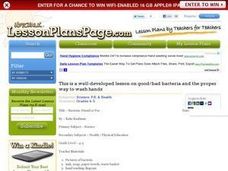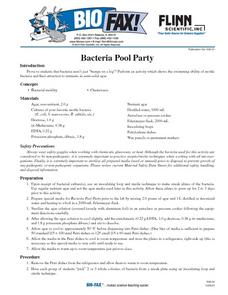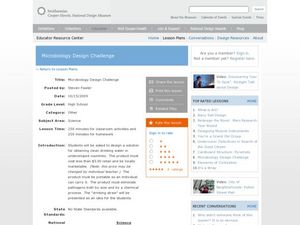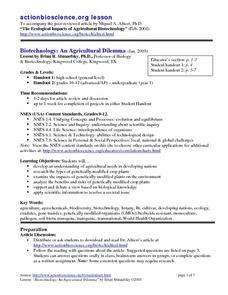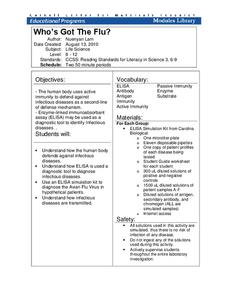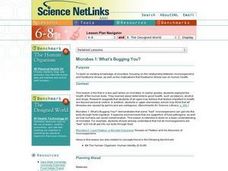Curated OER
Describe the Perfect Pathogen
Students develop a pathogen based upon their knowledge of pathogens and after presenting it to the class, they then suggest ways that the pathogen might be combated. Next they identify possible physical or behavioral changes in a...
Curated OER
Diversity of Life: Pathogens
Students research bacteria and viruses that carry pathogens. In this diversity lesson, students examine how pathogens spread disease through bacteria and viruses. Students write a report on disease caused by bacteria or virus including...
Curated OER
Gregory Carter
Young scholars explore how the immune system, fights a war with a pathogenic organism: one of the many bacteria, viruses, and protozoans that can infect our bodies and cause disease.
Curated OER
Bacteria: Friend or Foe?
Students examine a variety of environmental and industrial roles of bacteria. explore where bacteria can be found and distinguish bacteria from other organisms.
Curated OER
Pandemics and Epidemics
Students evaluate data related to population growth, along with problems and soultions: disease cvontrol. They are able to explain how changes in habitat may affect organisms. Students evaluate evolutionary theories and processes.
Curated OER
What's Bugging You?
Students examine the effects of pests on other organisms, crops, and the environment. they construct an insect observation chamber and discover how some insects can be pests in some situations and beneficial in others. They write "pest...
Curated OER
Changing Planet: Infectious Diseases Classroom Activity
Here is a different approach: emerging epidemiologists first go home to interview family on the topic of infectious disease. Then they come to class and view a video and PowerPoint that explore how climate change may increase the...
Curated OER
Bacteria Pool Party
Students investigate the organisms of bacteria. They are given a culture of bacteria that can be observed under a microscope. The students make observations that are recorded. The lesson includes the mention of specific safety...
Curated OER
Microbiology Design Challenge
High schoolers discover dangers to human health by researching what's in our drinking water. In this water purification lesson, students discuss the conditions of water in undeveloped countries and why it is unsafe to drink....
Virginia Department of Education
The Germ Theory and Koch’s Postulates
Explore the history of cholera and its effect on society with your biology class. Young biologists will then proceed to grow their own germs, prepared from live cultures, and follow the steps of the scientific method to generate data....
Curated OER
Pharmaceuticals and Treatments
Young scholars perform an experiment involving reverse transcriptase-polymerized chain reaction HIV replication to better examine the biotechnology used by scientists in pharmaceutical research of infections diseases like HIV. Students...
Curated OER
Body Battles!
Seventh graders explain the role of white blood cells in fighting infections. In this life science lesson, 7th graders create flow charts showing the immune response process. They act out and play a game to simulate actions of the immune...
Curated OER
Biotechnology: An Agricultural Dilemma
Students investigate the types of genetically modified crop plants there are and the benefits and risks of such plants. The agricultural needs in developing nations for this biological knowledge to resolve societal issues is also...
Curated OER
Applied Evolution: How Will We Get There from Here?
Students explore the basic process of natural selection and how people can manipulate that process today. The consequences of natural selection on daily life and the implications of evolutionary biology in basic and applied science is...
Curated OER
Chancing it
Seventh graders examine different transplant types and estimate the possible outcomes. In this biology lesson students discuss donors and transplants then divide into groups and complete a worksheet.
Curated OER
The Cantankerous Pathogen
Students explore what factors influence the spread of infectious diseases. They explain how human manipulation of the environment affects the transmission of diseases.
University of Minnesota
Homeostasis of Thermoregulation
Whether you're battling the flu or trying to warm up on a chilly day, your body's ability to react to temperature change is fascinating! Anatomy scholars discover the fantastic feedback loops that control body temperature in a rigorous...
PBS
Ebola Outbreak
As of April, 2016, more than 28,000 suspected cases of Ebola were recorded in Western Africa with over 11,000 human deaths. Classes discuss the Ebola virus outbreak in 2014 and then groups develop an action plan based on...
Cornell University
Who’s Got The Flu?
Become an immunologist for the day. Scholars elicit the use of the enzyme-linked immunoabsorbent assay (ELISA) to diagnose an infectious disease. Through the process, they learn about the immune system response to infectious diseases.
Curated OER
Keeping Milk Fresh
Students identify the risks of spoilage and pathogens in fresh milk. They investigate the farmer's role in keeping milk safe to drink and identify safety procedures used in dairy farming.
Curated OER
MICROBES 1: WHAT'S BUGGIN YOU?
Middle schoolers use existing knowledge of microbes, focusing on the relationship between microorganisms and foodborne illness, as well as the implications that foodborne illness has on human health.
Curated OER
Water Quality and Temperature
Young scholars are led through three activities to explore the effect of temperature fluctuations on the growth and survival of aquatic plants, clams, and shrimp eggs.
Curated OER
What's That Brown Fuzzy Stuff on My Plum?
Students use Koch's Postulates to determine that a specific organism is the root cause of a specific disease and identify what Koch's Postulates are within a protocol. They describe symptoms and signs of diseased fruit and isolate fungal...
Curated OER
Cows in Crisis
Students study mad cow disease and how it has affected the lifestyles of many Europeans. They examine local cattle industry and look for steer- or cow-related products. They organize information they find and present it to the rest of...



